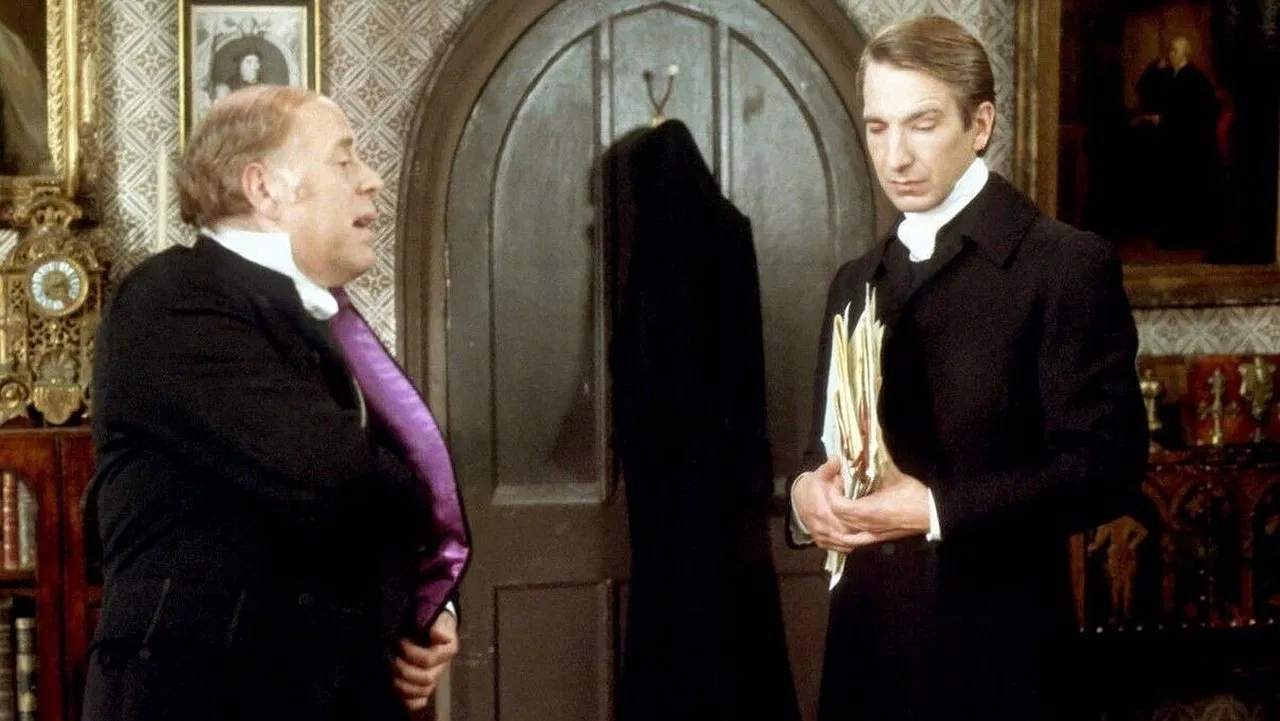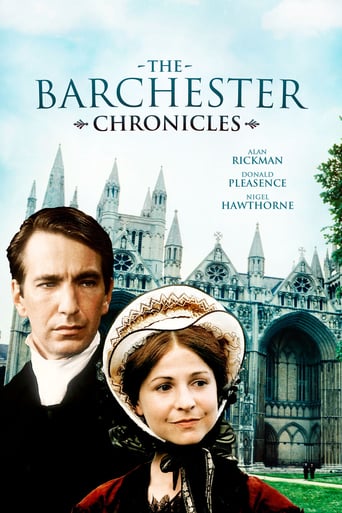

Anthony Trollope was a much underrated writer and storyteller. "The Warden" and "Barchester Towers" upon which "Barchester Chronicles" is based were great reads. More times than not literary classics are not easily adaptable to movies or TV, but BC is a rare exception.First, the acting is absolutely stellar. Particularly first-rate are Donald Pleasance as the kindly Septimus Harding, Nigel Hawthorne as the often exasperated Archbishop Grantly and Alan Rickman as the slyly clever passive-aggressive Obadiah Slope, and certainly last but not least Geraldine McEwan as the domineering Mrs. Prouty. The production design, scenery, directing and music combine to produce a wonderful mini-series that despite its 10-hour, 8-part length, is riveting and entertaining. It is also very funny as well as trenchant in its dissecting the hypocrisies of its time.I highly recommend BC to all who appreciate great Victorian literature. Kudos to the entire cast and crew, as well as the producers and directors for mounting such a splendid piece of theater.
... View MoreThat any miniseries as exquisite as this, dating from 1982, would be long unavailable in the U.S., and then appeal only to a small audience, while American rather than British TV and cinema from all reports take the world by storm and set the standard, is cause for amazement if not alarm. Need anyone look further to sympathize with the conservatives in this story, who are wont to feel, in Mr. Arabin's words, that all virtue is disappearing in the wake of modern "progress"? On the other hand, the author Anthony Trollope's star has risen recently among critics and academics; and, even if you have yet to read him, this adaptation will at least afford you a breath of relief that something is therefore going right.As the only (and minor) negative already noted by others, the character of Arabin is underdeveloped and perhaps miscast, or at least not well conceived and made up. We can even imagine that a scene or two written to this end were dropped at the last minute to save running time. Eleanor's eventual attraction to him surprises us, along with others in the story, almost enough to have _deus ex machina_ written all over it. While we must remember that a filmmaker cannot as easily as a novelist take a detour to acquaint us with an important character entering late, a problem remains for the audience here and something should have been done to solve it.Now back to the positives. The script is full of quotable lines worthy of the IMDb database. I'll work on it. I also admire this production as a celebration of music. Several times we glimpse Mr. Harding conducting or training one of the finest choirs in the world. Although I doubt that a cathedral precentor even in the 19th century would be directly responsible for this work, it is peculiar that anyone who is, precentor or not, would be consigned to poverty: but, as we know, such is often the way of things. Mr. Harding's musicianship is nevertheless a great source of joy to himself and others. As he tells his daughter brightly when they must move to humbler quarters, "But we shall take the music with us!" We must recognize in the cast, as Miss Thorne, the daughter of a great composer: Ursula Howells's father Herbert was the dean of cathedral music for two generations, leaving us a cornucopia of liturgical repertoire radiant with a distinctively Anglican mysticism. All concerned must have regarded her part in this production as a mutual honor and privilege. Along with the closing credits rolls a setting of the Jubilate Deo (Psalm 100) almost worthy of his pen, distinguished by a wistful violoncello part evoking the roles of all our Mr. Hardings.
... View MoreAlan Rickman was apparently the second choice for the part of Obadiah Slope. I have no idea who the original selection was - but I bet he's been kicking himself ever since!In the book, Slope is portrayed as a somewhat uneasy cross between a buffoon and a disturbing snake in the grass. Every time he threatens to become too dangerous, Trollope proceeds to undermine him again.I believe that the reason why Rickman was offered the part is because the director wanted an actor who could come across as amusing and sleazy, yet plausibly creepy - and sexy.Slope HAS to possess a great deal of animal magnetism, as this is what explains the extremely strong reaction he produces in otherwise respectable ladies of whatever age.Rickman certainly gets THAT across - in spades. He may not be conventionally good-looking - but he's totally incapable of playing an asexual character.Problem is, he ends up completely overwhelming Mrs Bold's other two suitors. Any heterosexual female viewer with any sense will keep shouting at the screen: "You daft bat! Forget Arabin! It's Slope you want!!!!!"I agree, Arabin is far better served by the book than this adaptation.
... View MoreThis was another historical series of novels, which the BBC faithfully adhered to (and they managed to run two unequally-sized volumes, "The Warden" and "Barchester Towers", together without the join showing).Donald Pleasance, normally noted for playing Bond villains, played the modest and unctuous Septimus Harding brilliantly. Nigel Hawthorne, as his son-in-law Dr. Grantly, provided the perfect combative foil. However, Alan Rickman, in one of his first major roles as the scheming Obadiah Slope, may have stolen the show. Clive Swift, as the henpecked Bishop of Barchester, established and refined the character he was later to play as the husband of Hyacinth Bouquet in "real" comedy.The location shots in cloisters give a very real impression of a withdrawn and contemplative clergy, obsessed with its own affairs and internal squabbles. The jarring note of the first two or three episodes, when John Bold questions whether a long-established tradition connected with a charitable bequest is indeed in the interests of the recipients of that charity, shows the how uneasy the various clerical characters are when dealing with the world outside.Many of the shots in scenes in a flat countryside seemingly locked into August throughout the eight episodes which covered a span of several years, also give the impression of withdrawal from the day-to-day life of any activity but that of the church.As an examination of the mores and attitudes of his period, Anthony Trollope produced a brilliant pair of novels. The BBC have produced an equally brilliant adaptation, although slow enough in pace to be almost soporific in parts.
... View More